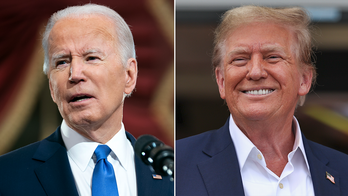Conservatives renew push for balanced budget amendment
Chuck Rocha and Katrina Pierson on anger over growing deficit
House and Senate GOP negotiators hit a snag in talks to construct a budget blueprint late Monday over a gimmick that would boost defense spending, but not have the extra dollars count against the federal deficit.
At issue is the budget phenomenon known as "chimps" — short for "changes in mandatory spending." "Mandatory spending" refers to money that the Treasury is obligated to spend every year without having to go to Congress for approval. The most well-known examples of mandatory spending include entitlements like Medicare and Medicaid.
The emerging budget plan would have delivered an almost $40 billion budget boost to the Pentagon while relying on deep cuts to domestic agency budgets and government safety net programs to promise a balanced budget by 2024.
However, it emerged late Monday that some lawmakers, including Sen. Bob Corker, R-Tenn., and Sen. Mike Crapo, R-Idaho objected to the use of chimps to pay for the increased defense spending. Appropriators have responded to their objections by warning that they would have to bust the books to find the money elsewhere, calling into question whether the proposed budget would be truly balanced.
The would-be budget plan sets broad goals but by itself has little teeth; instead, painful follow-up legislation would be required to actually balance the budget. It also permits the GOP majority to suspend the Senate's filibuster rule and deliver a special measure known as a reconciliation bill to Obama without the threat of Democratic opposition.
Republicans plan to use the special filibuster-proof bill to wage an assault on Obama's Affordable Care Act rather than try to impose a variety of painful cuts to Medicare, Medicaid, food stamps, student loans, and other so-called mandatory programs over Obama's opposition. Obama is sure to veto any attempt to repeal the health law, too, but Republicans want to deliver such a measure to Obama anyway.
The GOP plan is generally similar to cuts proposed by former Budget Committee Chairman Paul Ryan, R-Wis., — whose budget was largely endorsed by Mitt Romney as the duo formed the GOP presidential ticket in 2012 — with one significant difference. This year's compromise drops Ryan's plan to change Medicare into a voucher-like program for retirees joining the program in 2024.
This "premium support" plan would save significant money in future years by subsidizing purchases of private health insurance on the open market. But it would cover a smaller share of retirees' health costs as time goes on, which has drawn fierce opposition from Democrats and has unnerved Republican senators up for re-election in swing states.
The plan is likely to be a litmus test nonetheless for GOP presidential candidates. Two of the Senate's Republican presidential hopefuls, Ted Cruz of Texas and Rand Paul of Kentucky, voted against the Senate's budget last month as too timid, while Florida's Republican Sen. Marco Rubio endorsed it.
For now, the measure would allow for the advance of the 12 annual spending bills for the 2016 budget year beginning Oct. 1 to the House and Senate floors. Automatic spending cuts known as sequestration have forced cuts upon both domestic agencies and the defense budget but the GOP budget plan promises to alleviate the Pentagon cuts by padding off-budget war accounts by $38 billion.
The White House, however, is opposed to easing Pentagon cuts without providing relief to domestic programs as well. That has many Washington budget-watchers looking to a possible small-caliber budget pact later this year that would provide partial but immediate relief to agency budgets next year but paying for it by curbing spending elsewhere in the budget over the long term. The White House is open to the idea and House Speaker John Boehner, R-Ohio, endorsed the concept last week.
But first comes the vote on the budget resolution, which promises to break along party lines as Democrats blast its proposed spending cuts for disproportionately targeting the poor while Republicans try to sell the benefits of a balanced budget for the economy and future generations.
Lawmakers had hoped to bring a budget plan to the floors of both the House and Senate by the end of this week. It was not immediately clear what effect the chimps dispute would have on that timetable.
Fox News' Chad Pergram and the Associated Press contributed to this report.





